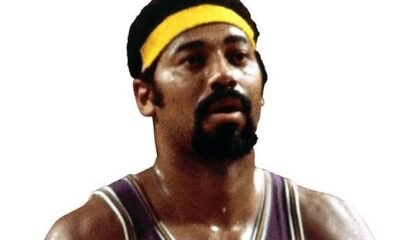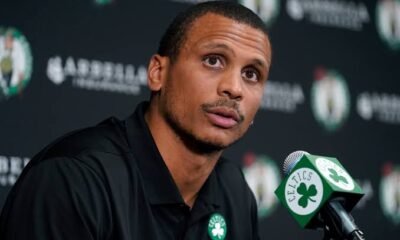Blog
Wishanhton capitals state Coach Exits After Rivals’ Jaw-Dropping $4 Million Offer: Here’s What Led to His Retirement!”
Washington Capitals State Coach Exits After Rivals’ Jaw-Dropping $4 Million Offer: Here’s What Led to His Retirement!
In a move that has sent shockwaves through the hockey community, the Washington Capitals State’s head coach, David Mitchell, announced his unexpected retirement after receiving a lucrative $4 million offer from one of the Capitals’ fiercest rivals, the Philadelphia Flyers. While the head coach’s departure from the Capitals is significant in its own right, the context surrounding this decision highlights the complex relationship between coaching, finances, and rivalries within professional sports.
#### The Announcement
Mitchell’s announcement came as a surprise to many, especially given his successful tenure with the Capitals. An official statement released by the Capitals read, “David Mitchell has decided to retire from his position as head coach effective immediately. We want to extend our heartfelt gratitude for his dedication, loyalty, and hard work during his time with the organization.”
The suddenness of his retirement leaves fans divided. While some expressed disappointment and frustration, others understood the allure of such a substantial offer from a rival team. “You can’t blame him for that kind of money,” stated longtime Capitals fan Sarah Thompson. “It’s a business, and at the end of the day, he has to look out for himself and his family.”
#### The Rise of David Mitchell
David Mitchell’s coaching career has been one marked by steady progress and impressive achievements. Taking over the Capitals in 2019, he led the team to the playoffs in multiple seasons, culminating in a thrilling run to the Eastern Conference Finals last year. His coaching style emphasized a blend of aggressive offense and disciplined defense, earning him widespread respect among players and fans alike.
Mitchell’s initial appointment was met with skepticism, as he was relatively inexperienced at the NHL level. However, he quickly dispelled any doubts by fostering a strong locker-room culture and developing young talent. Under his guidance, players such as Alex Ovechkin and Evgeny Kuznetsov thrived, while newcomers made significant contributions to the team.
His performance led to speculation that he was a candidate for various coaching accolades, and many viewed him as a potential contender for Coach of the Year honors. Yet, as his success grew, so too did the pressure to win at all costs—a pressure that ultimately played a significant role in his decision to retire.
#### The Eye-Catching Offer from Philadelphia
While Mitchell’s contributions to the Capitals are undeniable, it was the stunning $4 million offer from the Philadelphia Flyers that catapulted his exit into the spotlight. Within the NHL, such offers are often tied to a mix of performance and rivalry, with teams aiming to undermine their competitors by poaching talent.
Reports indicate that the Flyers saw Mitchell as a crucial piece in their attempts to reverse years of underwhelming performance. After missing the playoffs for several consecutive seasons, the Flyers are desperate to revitalize their franchise. They believe that Mitchell can instill a winning culture similar to the one he fostered with the Capitals.
The staggering figure of $4 million redirected observers’ attention to the financial aspect of professional sports. The NHL has seen a steady increase in coaching salaries, with clubs willing to spend big in order to secure top talent for their coaching staff. For Mitchell, this lucrative offer not only signified financial security but also an opportunity to lead a franchise that desperately needs a fresh start.
#### Factors Leading to Retirement
While the financial aspect is compelling, various factors contributed to Mitchell’s decision to retire from the Capitals:
1. **Burnout and Pressure**: The demanding nature of coaching at the highest level can lead to burnout. After a grueling season that included injuries, high player expectations, and the desire to deliver a championship, the pressure to perform can weigh heavily on even the most seasoned coaches. Observers noted that Mitchell seemed increasingly fatigued as the season progressed, leading to the speculation that he needed a change.
2. **Future Considerations**: With the arrival of new talent and potential shifts in team dynamics following the upcoming draft, Mitchell may have sensed that the team’s direction would soon change. Being a key player in such decisions can add unwanted stress. The desire to step away from this potentially tumultuous situation likely factored into his retreat.
3. **Family Priorities**: Discussions with insiders suggest that Mitchell’s decision was also personal. The demands of an NHL coaching job often come at the expense of family time. After significant years in the hectic world of hockey, the coach expressed a desire to spend more time with his family and reassess his professional commitments. Coupled with a substantial offer from a rival team, it created an opportunity for him to transition into a new stage of life.
4. **Desire for a New Challenge**: Coaching the Flyers could offer Mitchell a new platform to excel. Given the Flyers’ rich history, the chance to revive a struggling franchise allows Mitchell to redefine his identity as a coach while competing against the Capitals—a rivalry that is both historic and charged with intensity.
#### Fan Reactions
The hockey community reacted swiftly to Mitchell’s announcement. Capitals fans expressed their grief over losing their coach, but many also recognized the potential upside of his decision. “It’s bittersweet,” said Capitals season ticket holder Mike Johnson. “We wanted him to stay, but you can’t fault him for taking that much money, especially to coach a rival.”
In the same breath, Flyers fans celebrated the acquisition, eagerly anticipating what Mitchell would bring to their team. Social media platforms exploded with comments and memes, showcasing their excitement as fans debated whether this marked the beginning of a new era.
#### What’s Next for the Capitals?
With Mitchell’s departure, the Washington Capitals face a crucial offseason. The organization will have to make inquiries into potential candidates to fill the coaching vacancy and ensure that they maintain their competitive edge. Sources within the organization suggest that they are already compiling a list of prospective hires—names rumored to include established coaches and rising stars, each representing different coaching philosophies.
Moreover, the Capitals need to maintain their strong roster continuity while considering potential player trades and draft picks. The front office is likely to emphasize stability, creating a seamless transition for both players and fans.
#### Conclusion
David Mitchell’s departure from the Washington Capitals marks the end of a significant chapter for the team and the coach. His unexpected retirement announcement, prompted by a jaw-dropping $4 million offer from the Philadelphia Flyers, reflects the evolving landscape of professional sports — one where financial incentives and personal aspirations can reshape careers in an instant.
As he embarks on this new journey, Mitchell leaves behind a legacy of success in Washington, one built upon resilience and growth. The Capitals will now shift their focus to finding the right candidate to guide them through the uncertainties of the upcoming season.
The decision carries with it lessons about ambition, the realities of professional coaching, and the enduring nature of rivalry in the world of sports. In the pursuit of fulfillment—both personal and professional—Mitchell chose to step away from the spotlight, reminding us all that sometimes, it’s essential to prioritize what truly matters. Only time will tell how this decision shapes both his future and the fortunes of the teams he leaves behind.
-

 Arsenal2 years ago
Arsenal2 years agoSad News Arsenal ex player who is goal scorer confirmed dead this morning
-
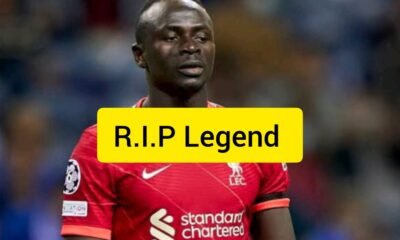
 Liverpool2 years ago
Liverpool2 years agoSad News Sadio Manè Confirmed Dead Today By Sky Sports Reporters, Open For Full Story 👇
-
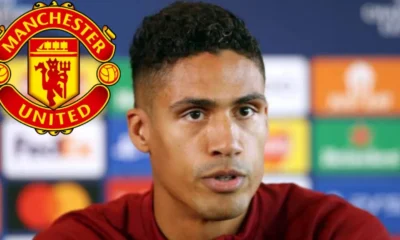
 Blog2 years ago
Blog2 years ago“I was forcefully removed from Manchester United squad and now I’ve joined the best team in the world…I will revenge and as a result, I’ve ordered my friend who’s their best player currently to leave there with immediate effect and he has agreed”: Former Man United player angered by United decision to removed him from the squad as he ordered the Club’s best player to leave immediately.
-

 Blog1 year ago
Blog1 year agoSad News: Manchester United player died when playing for his country England yesterday 😢 😔
-

 Blog2 years ago
Blog2 years agoR.I.P: Formal Real Madrid and France international confirm death this morning
-

 Chelsea2 years ago
Chelsea2 years agoBreaking New:”Roman Abramovich could get Chelsea back”? Chelsea owner review the conversation between him and Roman Abramovich in. Deal about getting Chelsea back
-

 Blog2 years ago
Blog2 years agoUNBELIEVABLE: Manchester City midfielder KELVIN DE BRUYNE divorced wife this morning after DNA test revealed their 5 years old son belongs to formal Manchester United player
-
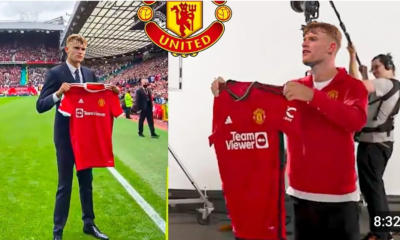
 Manchester United2 years ago
Manchester United2 years agoOFFICIAL NOW: Manchester United announce the signing of 23yr sensational player after beating Liverpool and Madrid for His signature, agreement reached on a 5yr deal, Medical completed – announcement ongoing





